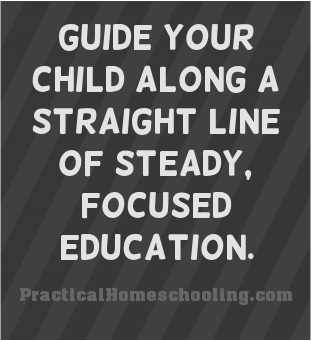 My approach to education might best be illustrated by a series of points on a line. Any high school student knows: 1) A line may be defined as the distance between two points. 2) Between any two points there exists one and only one line. 3) A straight line is the shortest distance between two points. 4) A line contains an infinite number of points.
My approach to education might best be illustrated by a series of points on a line. Any high school student knows: 1) A line may be defined as the distance between two points. 2) Between any two points there exists one and only one line. 3) A straight line is the shortest distance between two points. 4) A line contains an infinite number of points.
My goal was to educate my children entirely at home while moving them along that line of progression without taking meandering forays which would not only bring nothing to the learning process but might actually serve as an impediment. To accomplish that goal, I opted for very structured curricula and a three-hour school day, five days a week, twelve months a year. We used Calvert School for grades 1 though 8, the American School for high school, Brigham Young University for undergraduate degrees, and California State at Dominguez Hills for graduate degrees.
After nineteen years of walking this line, what would I change? Absolutely nothing. Since by definition a line has no width, balancing on one for an extended period of time can be tricky -- especially while leading ten children -- but with practice the technique can be mastered. The secret is to focus on the point directly ahead and walk toward it at a steady pace; looking beyond to distant points may cause dizziness resulting in a nasty fall. Likewise, sudden stops and starts coupled with alternating periods of immobility and speed sprints may send vibrations through the line causing the children, whose powers of concentration are not yet fully developed, to lose sight of the point on which they should be focusing.
On the more positive side, it should be noted that it is impossible to lose one's way while walking a well-defined line. Once the line has been drawn and the points have been plotted, all one needs to do is put one foot in front of the other. Yet, because any line contains an infinite number of points, it allows the one drawing the line to plot as many goals as she wishes without leaving the direct path to the final destination.
Perhaps the most important property of a line to keep in mind when using this approach to education is that in theory a line has no end. After the final educational goal has been reached, the line continues on into infinity so that the child who has learned to mark goal points, concentrate on the point directly ahead, and move at a constant, steady pace, can continue to walk that shortest and most direct path to other life goals.
Mary allowed each of us 500 hundred words to complete this assignment, but I find that I do not need 500 words to outline my ideal education. Seven will do just fine: elementary school, high school, university, graduate school.